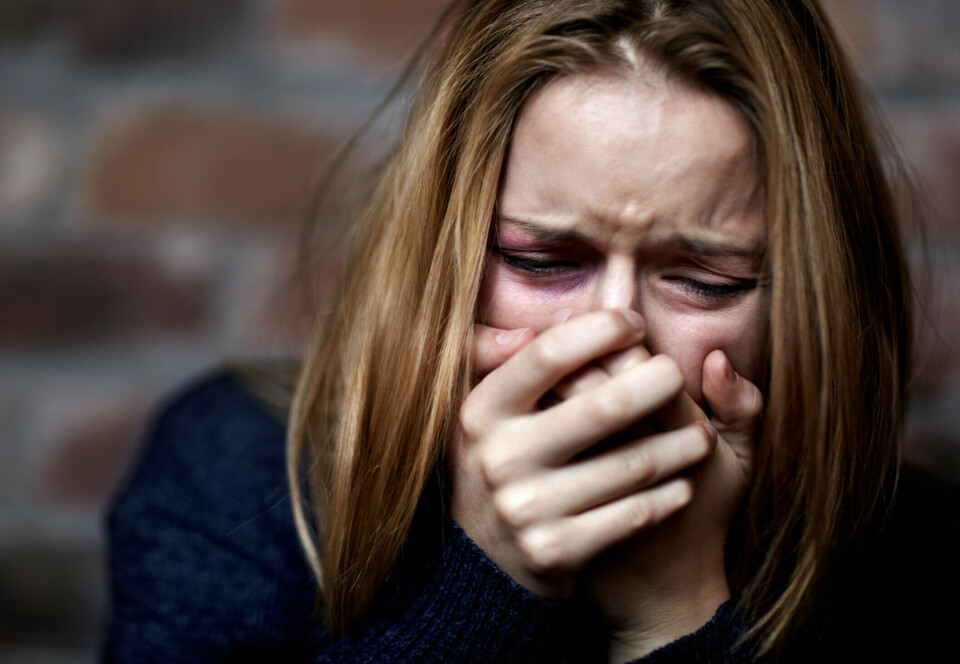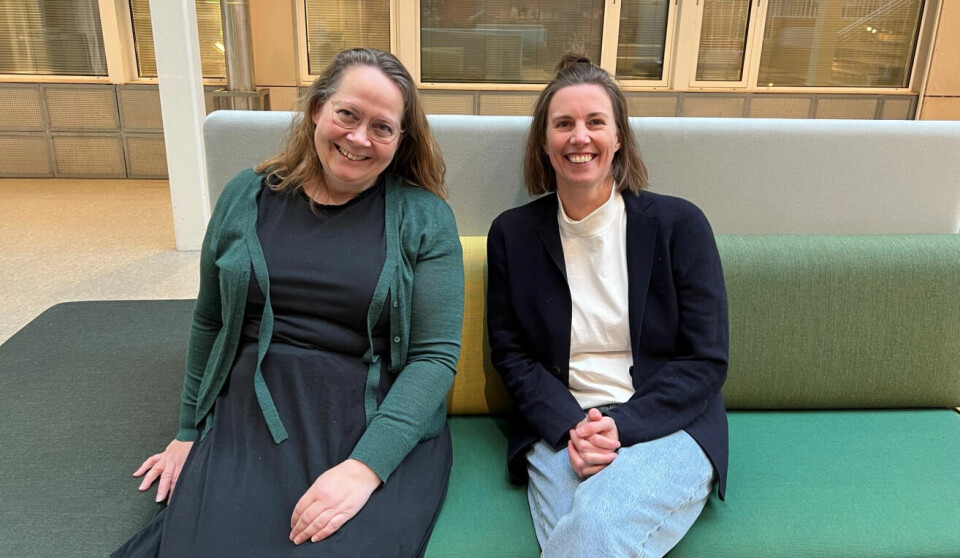THIS CONTENT IS BROUGHT TO YOU BY University of Oslo - read more

Should all rapes be reported?
Why do so many choose not to report rape? Research shows that the trauma of talking about the abuse, as well as owning one’s own narrative of what happened, can be crucial.
There is currently a strong expectation in Norway that people should report cases of rape.
This is according to Professor May-Len Skilbrei at the University of Oslo's Department of Criminology and Sociology of Law. In a new Norwegian podcast episode of Universitetsplassen, she is accompanied by postdoctoral fellow Anette Bringedal Houge from the Institute of Health and Society, to discuss the topic of rape.
A legal hierarchy of rapes
Juridification refers to a trend where an increasing number of areas become governed by legal regulations.
It denotes the increasing influnece of law in social life and politics, with a rising number of life's facets being approached, interpreted, and resolved as legal matters.

This expansion of the law also leads to a broadening of lawyers’ understanding of reality and phenomena.
“This influences the way we as a society understand rape and sexual offences, perpetrators, causes, and consequences far beyond the cases that actually go to trial,” Houge says.
According to the researcher, juridification creates a hierarchy of rapes, where those that are provable in court weigh heaviest in society.
“The dominance of criminal law comes at a cost to those who are not believed by the legal system,” she says.
The cost of speaking out
When a raped woman decides to report the assault to the police, she leaves it to experts to determine whether what she has experienced qualifies as rape in a courtroom.
The experience of violence she felt has become a legal question for others to assess and consider.
In an article, Anette Bringedal Houge writes about what juridification does to narratives about and experiences of rape.
Blood and semen become pieces
In specific rape cases, the victim’s experience is reviewed, retold, divided, and turned into objects through blood, semen, discharge, saliva, and urine, which are tested for DNA and drugs.
These parts are distributed across a multitude of actors who carry out various tasks in the investigation. They include investigators, case officers, forensic geneticists, toxicologists, nurses and doctors in sexual assault reception centres, GPs, and witnesses.
All of these pieces are then put back together on a timeline and considered as evidence. They play a vital role in shaping the perceived credibility of both the victim and the accused.
“An often intimate and painful story about something that has happened in a complex situation, involving subsequent contemplation over one’s own responsibility, must be ‘sent out into the world’ through the narrative and understood by people who do not know the victim. It can be perceived as an additional burden for rape victims to experience that they lose control of their own narrative when it has to be repeated in different legal contexts,” Houge says.
Narratives are simplified and retold
In the event of a police report, the focus will largely be on those aspects of the experience that can support the legal definition of rape.
In such a process, the narrative of a perceived offence can be simplified quite a lot.
“Narratives of abuse told to those closest to you can have a richness and a focus on context that perhaps narratives in other contexts can't have, because one must simplify things. With regards to the police and the legal system, the goal will be to present things as clearly as possible. As a result, the narrative might lose the complexity that could be important to the victim, the very thing that makes the victim feel ownership of their narrative,” Skilbrei says.
This is how the experience of telling someone you have been abused and the purpose of the narrative varies depending on who you talk to. Skilbrei emphasises that telling a friend is something very different from telling the police.
Over the past 10 years, developments in how criminal law deals with rape have been characterised by a broadening of what constitutes rape and sexual offences, at the same time as the penalties are becoming harsher.
“Today, people who say they have been victims of rape are urged to go to the police. Reporting has become part of the standard procedure. It's expected that rapes are reported. Implicit in the expectation is the attitude that it is in society’s interest that rapes are prosecuted,” she says.
Reporting has become a standard procedure
Through increased juridification, society hopes to prevent new rapes and to create safety and security in society. This is based on an optimism – a legal optimism about what the law as an institution can achieve.
“Turning to the law and reporting is presented as a solution to a negative and offensive experience. It is often presented as something that is in the victim’s own interest, as well as society’s,” Skillbrei says.
“What do you think about the norm of reporting as ‘tandard procedure?”
“I think that a rape can be experienced and dealt with in many different ways. However, it may seem unfair to victims that making a report increases their burden by having to take responsibility for society’s ability to prevent future rapes,” she says.
According to Skilbrei, many victims experience individual, cultural, and structural barriers when reporting rape to the police. Currently, there are still only a small number of victims in Norway who report that they have been raped.
Most do not report
In 2023, the Norwegian Centre for Violence and Traumatic Stress Studies conducted a survey. 22 per cent of the women, and 3 per cent of the men, answered that they had experienced rape either through force and coercion or while they were asleep.
More than 80 per cent of these, combined with those who stated that they had experienced online sexual offences, stated that the police were not made aware of the incident.
Based on police report statistics, the National Criminal Investigation Service (NCIS) has reported that around 1,500 rapes involving victims over the age of 14 were reported in 2019, and the sexual assault reception centres received a total of just over 2,000 inquiries during the same year.
Houge has reviewed police reports regarding all the rape cases brought to trial in 2019. In collaboration with NCIS, she has identified less than 200 rape cases that received Norwegian court rulings in 2019.
She has also reviewed all sleep-rape convictions at the court of appeal level for 2019 and 2020 together with Solveig Laugerud.
Victims make active choices
Skilbrei, along with Maria Hansen and Kari Stefansen, interviewed 15 women who have experienced rape.
In a scientific article from the study, they write about how women who refrain from reporting rape give meaning to the choices they make.
“In the aftermath of rape, victims often need to balance their own needs and expectations with those of society. When the women talk about the rape and how they then manoeuver to reconcile conflicting norms and needs, they quite often justify their choices in other ways than what society might expect,” Skillbrei explains.
The research showed that actions that can be interpreted as passive – such as not reporting a rape – can rather be seen as an active choice that stems from cultural frameworks other than those that place the responsibility on the victim to prevent risk to others.
The women interviewed were rape victims, but they were not willing to take on the role of victim in a discourse where being a ‘rape victim’ is seen as an identity with consequences for how others see them and how they must act.
“We were actively looking for women who had experienced rape, and who defined it themselves as rape, but who had not reported it. The purpose was to shed light on the processes behind this choice, precisely at a time when there is such a strong focus on reporting being the morally and personally correct thing to do. One of the things we found was that when a victim’s narrative of rape is told by other actors, she loses control of it,” Skillbrei says.
Wanting to stay in control
An important reason for not reporting a rape was not wanting to lose control of one’s own narrative, or to reclaim the narrative of who one was when the assault occurred and who one is afterwards, so that the woman herself can control how things proceed.
“Even though these were women who considered themselves victims of rape, it was still important for them to frame it in a way that made it possible for them not to let it affect their everyday lives too much. Not letting it become an identity that characterises how they see themselves or are seen by others,” the researcher explains.
Skilbrei says that being the victim of rape is something that can easily become very dominant if others see you as ‘the raped woman’.
Seeing as rape often occurs in contexts involving several people you know, committed by people in the same social network, it can have a major impact on a person’s everyday life.
The podcast episode, which is in Norwegian, can be found below:
References:
Dale et al. Omfang av vold og overgrep i den norske befolkningen (Prevalence of Violence and Sexual Abuse in Norway), Rapport nr. 1 2023, Norwegian Centre for Violence and Traumatic Stress studies, 2023.
Hansen et al. Non-reporting of sexual violence as action: acts, selves, futures in the making, Nordic Journal of Criminology, 2020. DOI: 10.1080/2F2578983X.2020.1867401
Houge, A.B. Rettsliggjøringens problem: argumenter for en annen samtale om voldtekt (The problem of juridification: arguments for a different conversation about rape), Tidsskrift for kjønnsforskning, 2023.
———
Read the Norwegian version of this article at forskning.no

This content is paid for and presented by the University of Oslo
This content is created by the University of Oslo's communication staff, who use this platform to communicate science and share results from research with the public. The University of Oslo is one of more than 80 owners of ScienceNorway.no. Read more here.
More content from the University of Oslo:
-
Mainland Europe’s largest glacier may be halved by 2100
-
AI makes fake news more credible
-
What do our brains learn from surprises?
-
"A photograph is not automatically either true or false. It's a rhetorical device"
-
Queer opera singers: “I was too feminine, too ‘gay.’ I heard that on opera stages in both Asia and Europe”
-
Putin’s dream of the perfect family




































